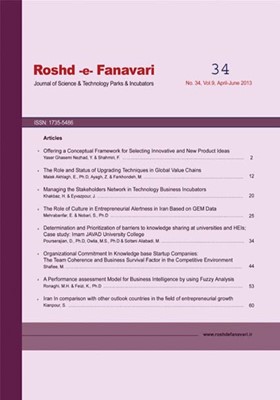-
-
List of Articles
-
Open Access Article
1 - Offering a Conceptual Framework for Selecting Innovative and New Product Ideas
Yaser Ghasemi nejad Farhad Shahmiry -
Open Access Article
2 - The Role and Status of Upgrading Techniques in Global Value Chains
Zahra Ayagh Mahsa Farkhondeh Esmaeil Malek Akhlagh -
Open Access Article
3 - Managing the Stakeholders Network in Technology Business Incubators
Hasan KIhakbaz Jafar Eyvazzpour -
Open Access Article
4 - The Role of Culture in Entrepreneurial Alertness in Iran Based on GEM Data
Ehsan Mehraban Sabina Nobary -
Open Access Article
5 - Determination and Prioritization of Barriers to Knowledge Sharing at Universities and HEIs; Case study: Imam JAVAD University College
Daruosh Pourserajian Mozhgan Soltani Aliabad Mohammad Saleh Oliua -
Open Access Article
6 - Organizational Commitment in Knowledge base Startup Companies: the Team Coherence and Business Survival Factor in the Competitive Environment
Mehrdad Shafiei -
Open Access Article
7 - A Performance Assessment Model for Business Intelligence by using Fuzzy Analysis
MohammadHosein Ronaghi Kamran Feyzi -
Open Access Article
8 - Iran in Comparison with other Outlook Countries in the Field of Entrepreneurial Growth
Saeed KiyanPour
-
The rights to this website are owned by the Raimag Press Management System.
Copyright © 2017-2026







